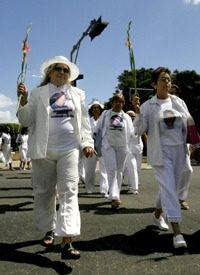
Members of a Cuban opposition group known as the “Ladies in White” were hauled away by Cuban police on Wednesday after they staged a peaceful protest march to oppose the 2003 arrest of their husbands and sons.
This week marks the seventh anniversary of “Black Spring,” a term given to the 2003 government crackdown of political “dissidents,” or human rights defenders, in Cuba. Seventy-five activists throughout Cuba were arrested, tried, and sentenced to as many as 28 years in prison. Currently 54 remain in jail, many suffering from severe illnesses as a result of poor prison conditions.
To pay homage to the Black Spring prisoners, the wives, sisters, and daughters of the prisoners formed the Damas de Blanco, Ladies in White, who march every Sunday through Havana to protest the arrests and promote human rights.
The Ladies in White regularly hold religious services, peaceful marches, and assemblies in front of government offices to mark the anniversary of the arrests, but their events are usually interrupted by government-organized mobs.
At Wednesday’s protest, the Ladies in White were armed with flowers and chanted “Freedom” and “Zapata lives.” Orlando Zapata Tarnayo was an imprisoned dissident who died after an 85-day hunger strike, which helped to inspire the recent bout of marches. Zapata was one of many dissidents who used a hunger strike to protest the regime. Others include Guillermo Farinas, currently hospitalized after collapsing on Thursday, and Orlando Fundora, a former political prisoner.
Two hundred government supporters heckled the 30 or so peaceful protestors with shouts of “Worms, get out of here. Viva Fidel! Viva Raul!”
Witnesses say the women resisted, but were dragged onto a bus by their legs, arms and hair by Cuban police. They were taken to the home of Laura Pollan, a group leader.
Cuba’s arrest of 200 political prisoners and treatment of the hunger-strikers has prompted condemnation from the United States and Europe.
Cuban leaders contest that the dissidents are enemies working for the United States government, with the intent to subvert the government. They assert that international pressure will not prompt any changes in the way they treat their opposition.
Fidel Castro ceded control of Cuba to his brother Raul in 2008, but any hopes that this move meant change were quelled when Raul announced that Fidel would serve as “commander in chief” and continue to be consulted in important matters.
Fidel’s strong hold in Cuba remains evident. In response to the protest, house-wife Odalys Puente asserts, “They are invading Cuban territory. This street belongs to Fidel.”
Wednesday’s march was the third of the week, and despite the harsh treatment of the police officers, the women intend to march today as well.
Berta Soler, member of Ladies in White, says, “When a wild animal is penned up, it does this and much more. We are ready for everything. We have no fear.”
In a 2008 report to the UN Human Rights Council, the Cuban government claimed that all Cubans “fully and universally enjoy all human rights.” Michael Moore might believe that, but the rest of us know better.




